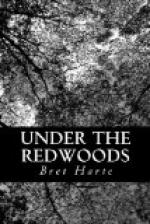Mr. Jackson Potter halted before the little cottage, half shop, half hostelry, opposite the great gates of Domesday Park, where tickets of admission to that venerable domain were sold. Here Mr. Potter revealed his nationality as a Western American, not only in his accent, but in a certain half-humorous, half-practical questioning of the ticket-seller—as that quasi-official stamped his ticket—which was nevertheless delivered with such unfailing good-humor, and such frank suggestiveness of the perfect equality of the ticket-seller and the well-dressed stranger that, far from producing any irritation, it attracted the pleased attention not only of the official, but his wife and daughter and a customer. Possibly the good looks of the stranger had something to do with it. Jackson Potter was a singularly handsome young fellow, with one of those ideal faces and figures sometimes seen in Western frontier villages, attributable to no ancestor, but evolved possibly from novels and books devoured by ancestresses in the long solitary winter evenings of their lonely cabins on the frontier. A beardless, classical head, covered by short flocculent blonde curls, poised on a shapely neck and shoulders, was more Greek in outline than suggestive of any ordinary American type. Finally, after having thoroughly amused his small audience, he lifted his straw hat to the “ladies,” and lounged out across the road to the gateway. Here he paused, consulting his guide-book, and read aloud: “St. John’s gateway. This massive structure, according to Leland, was built in”—murmured—“never mind when; we’ll pass St. John,” marked the page with his pencil, and tendering his ticket to the gate-keeper, heard, with some satisfaction, that, as there were no other visitors just then, and as the cicerone only accompanied parties, he would be left to himself, and at once plunged into a by-path.
It was that loveliest of rare creations—a hot summer day in England, with all the dampness of that sea-blown isle wrung out of it, exhaled in the quivering blue vault overhead, or passing as dim wraiths in the distant wood, and all the long-matured growth of that great old garden vivified and made resplendent by the fervid sun. The ashes of dead and gone harvests, even the dust of those who had for ages wrought in it, turned again and again through incessant cultivation, seemed to move and live once more in that present sunshine. All color appeared to be deepened and mellowed, until even the very shadows of the trees were as velvety as the sward they fell upon. The prairie-bred Potter, accustomed to the youthful caprices and extravagances of his own virgin soil, could not help feeling the influence of the ripe restraints of this.
As he glanced through the leaves across green sunlit spaces to the ivy-clad ruins of Domesday Abbey, which seemed itself a growth of the very soil, he murmured to himself: “Things had been made mighty comfortable for folks here, you bet!” Forgotten books he had read as a boy, scraps of school histories, or rarer novels, came back to him as he walked along, and peopled the solitude about him with their heroes.




